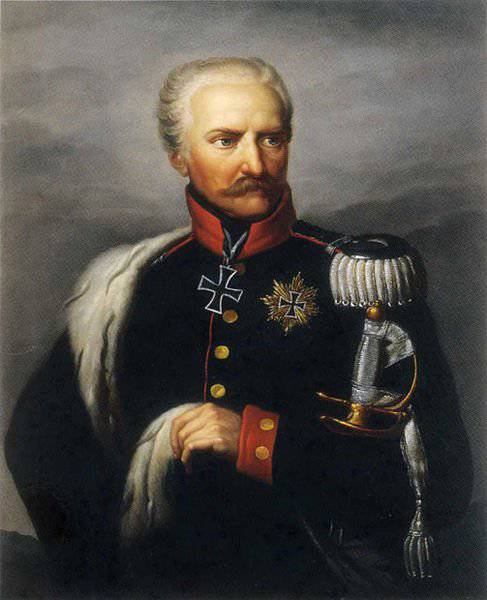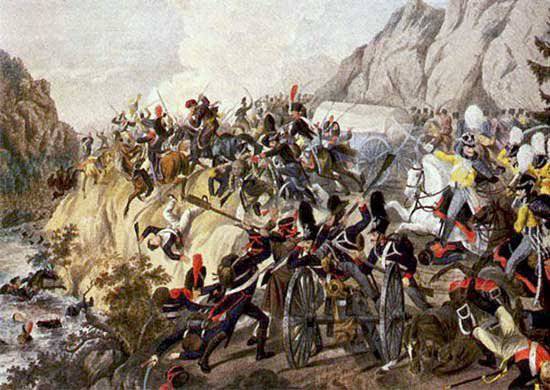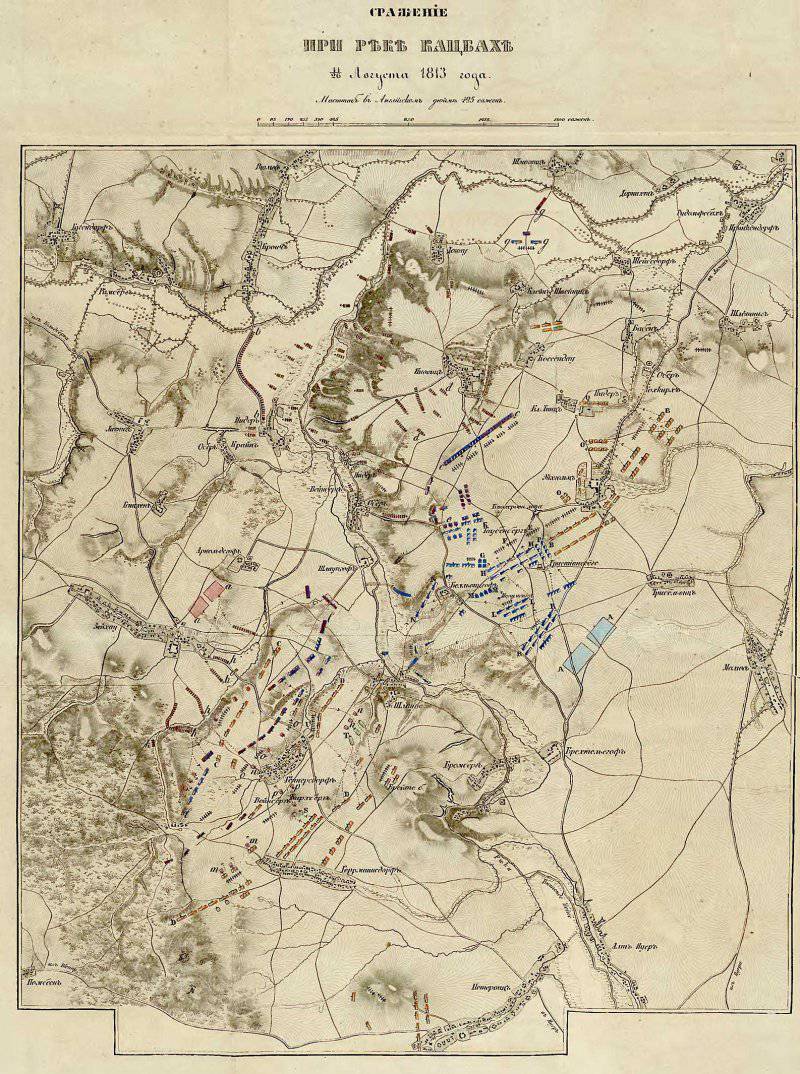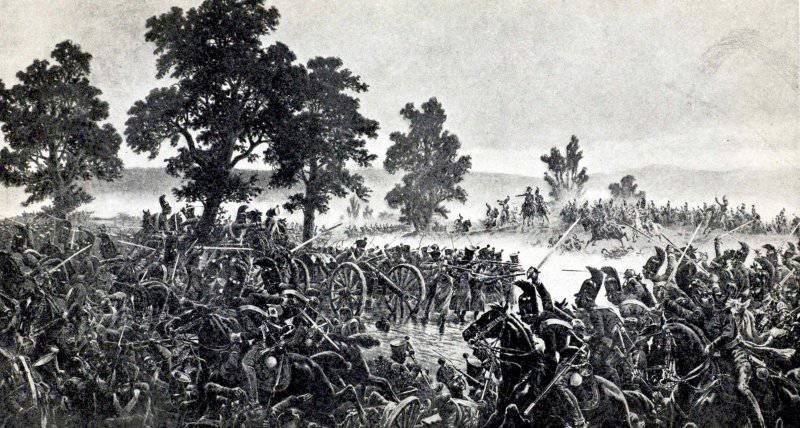Battle of Katzbach
As mentioned in the article The end of the 1813 truce of the year. Battle of Grosberen 23 August 1813 of the year, after the cessation of the Pleiswitz armistice, the Silesian army under the command of the Prussian General Blucher was the first to launch an offensive. Napoleon, considering that these were the main forces of the Allies, led the troops to the Silesian army, but after learning about the movement of the Bohemian army towards Dresden, he was forced to turn back, leaving a barrier under Macdonald’s command against Blucher. The French marshal received the mission to go to Breslau to separate the Prussian Silesia and the Austrian Bohemia.

Gebhard Leberecht von Blucher (1742 - 1819).
The ratio of forces and disposition
The Silesian army numbered about 100 thousand people (more than 60 thousand Russian and about 40 thousand Prussians) with 340 guns. Of these, 14,3 thousand regular cavalry, 8,8 thousand Cossacks. The army had two Russian corps and one Prussian: Russian corps under the command of Lieutenant-General Fabian Vilhelmovich Osten-Sacken (18 thousand soldiers with 60 guns), Russian corps of General-Infantry Alexander Fedorovich Langeron (43 thousand men, 176 guns ) and the Prussian corps under the authority of General Johann Yorke (38,2 thousand people, 104 guns). About 70-75 thousand people participated in the battle itself. Some of the forces of the Silesian Army were detached to other directions — the troops of Count Saint-Priest and Major-General Palen, and up to 12, thousands of people had already died, been wounded, fell ill or deserted.
The Silesian army took up positions on the right bank of the Katsbach on the flat plateau of Jauer. From the south-west plateau skirted the Katsbach tributary, the Neuss river. The body of Osten-Sacken was located on the right flank, the Langeron was on the left flank, and the Prussians stood in the center. Neisse separated the Russian corps of Langeron from the main forces of the army of Blucher.
In the first line of the Osten-Sacken Corps, there was the Neverovsky 27 Infantry Division, in the second, the Lieven 10 Infantry Division. Kurland and Smolensk dragoon regiments under the command of Major General Ushakov on the right flank of the second line behind the village of Eichholz. The 2 Hussar Division, under the command of Adjutant General Vasilchikov, is located to the right of Eichholz, and the Karpov Cossack regiments at the end of the right flank. In the first line of the York corps stood the 7-I Brigade of the Forge - the right wing, the 8-I Brigade of Gunerbein - the left. The battalion of the Brandenburg Regiment, the 11 and 36 of the Russian Jäger Regiments occupied the village of Schlaupe, maintaining contact with the Langeron corps. With the same purpose, Schlaup had a landwehr and grenadier battalions, two squadrons of the Brandenburg Hussars and two squadrons of the East Prussian National Regiment. In the second line were the 1-I brigade of Colonel Steinmetz and the 2-I brigade of the Prince of Mecklenburg. Then the second brigade was pushed into the first line, between the 7 and 8 brigades, and the 1 brigade was sent to help the Langeron corps. The reserve was cavalry under the command of Colonel Yurgas.
The advanced troops of the Lanzheron Corps were the 45 and 29 th Chasseurs regiments, the Arkhangelsk and Old-Ingermanland regiments, the 2 Ukrainian Cossack, Livonia cavalry Jaeger, Kiev dragoon regiments. Behind them were the main forces: the 6 th infantry corps of Prince Shcherbatov as part of the 7 th and 18 th divisions, the 9 th infantry corps of Olsufyev - 9 th and 15 th divisions, chasseurs regiments. The 10 infantry corps and cavalry were in reserve.
It should be noted that the Silesian Army was exhausted by the August 21-23 battles, forced crossings, committed in inclement weather, and lack of provisions, this led to an increase in the number of patients and deserters. The corps commanders expressed dissatisfaction with Blucher, not understanding the meaning of the march, first forward, then back. The only way to restore authority in the army was a decisive victory.
Macdonald's forces are located on the wooded hills along the left bank of the Katzbach. His grouping (nicknamed from the Beaver River - Boberian Army) included: 5 Infantry Corps commanded by General Jacques Louriston, 11 Infantry Corps under General Etienne-Maurice Gérard, 3 Infantry Corps of General Joseph Suam (Soghard Surag), General Joseph Suam (Soghard Gérard, General Joseph Sumah Infantry Corps of General Joseph Suam (Suegh Surag) 2 Cavalry Corps Horace Sebastiani de La Porta. Total group MacDonald numbered about 80 thousand soldiers (including 6 thousand cavalry), with 200 guns. There were about 60-65 thousand soldiers on the battlefield.
Scheme of the Battle of Katzbach 14 (26) August 1813
Battle
The whole day of 14 (26) of August was a heavy downpour, it was already the third day. Blucher, because of the delay of the French, decided that they had gone on the defensive and wanted to go on the offensive. He received information from intelligence that Napoleon had departed with a large part of the army and wanted to take advantage of the weakening of the enemy and give him a decisive battle.
But the French troops were the first to force the Katzbach River. The French commander had planned to push the enemy further into Silesia, and hoped that the mere appearance of his army would be enough for the enemy to retreat. MacDonald gave the order to conduct reconnaissance over the river and in the afternoon the French forced the river and Neuss across the bridge and the ford. The 3 th corps of Suama was supposed to bypass the right flank of Blucher, but the corps could not solve this problem because of the impossibility to cross the river. As a result, the strike of MacDonald’s army was weakened. The division from the 5 corps directed toward Schönau, the division of Ledrew of the 11 corps sent to Girshberg, the division of Charpentier and two divisions of the 3 corps did not take part in the battle. MacDonald himself was with the troops of Loriston, and lost the opportunity to lead the course in the most decisive direction, in the center. French cavalry forced the river without interference, without finding the enemy. The infantry moved behind the cavalry.
From the corps of York first entered into a hand-to-hand battle with the enemy 8-I brigade. She destroyed the French battalion in hand-to-hand combat and overturned two battalion squares. Enemy guns were captured. French horse rangers tried to help the infantry, but were thrown back by the cavalry of Colonel Yurgas, the National Regiment, the 1 of the West Prussian and Lithuanian Dragoons. They were followed by the 1-th Neumark Landwerk and Brandenburg Ulan regiments. The Lithuanian dragoon regiment distinguished itself most of all, which broke through the French line of infantry and artillery and walked along the French rear, cutting out infantry and cannon-servant, leading a significant number of enemy guns to inactivity. When the French cavalry attacked the dragoons, the Lithuanian regiment rescued the attack of the Prussian reserve cavalry.
However, the attack of the Prussian cavalry did not decide the outcome of the battle. 2 th cavalry corps Sebastiani completely turned around, the Prussian cavalry, stuck in the mud, in the pouring rain, lost its impact force. Three French battalions climbed to the height of Kugberg and opened fire on the flank of the Prussian cavalry. Prussian cavalry was forced to retreat. The French, pursuing the Prussians, broke into their first line of infantry. In the first line had to push the 2-th brigade of Prince Karl of Mecklenburg. Blucher himself rushed into battle. After a stubborn battle, the French were rejected.
At the same time, the corps of Osten-Sacken went on the offensive. Around 17 watch corps attacked the enemy from three directions. Major General A.A. Yurkovski with Mariupol and Alexandria Hussars hit the enemy from the front. Major General S.N. Lanskoy with the Belarusian and Akhtyrka hussars struck the left flank. And six Cossack regiments A.A. Karpov went to the rear of the enemy. 27-I Infantry Division Neverovsky advancing behind the hussars. Heavy rain restricted the use of guns, so the infantry hit the bayonets. Prussian cavalry regained its ranks and supported the attack. MacDonald hoped that the flank of Gerard's 11 corps would cover Suam's 3 corps, but he did not have time to come to the rescue of the attacked corps. The French cavalry was overturned by superior forces and, having run, brought their infantry into disarray.
Blucher, seeing the success of the cavalry, ordered the entire infantry of the corps of York and Osten-Sacken to attack. The French infantry tried to stop the enemy, but was discarded. When one of the divisions of the 3 of the French Corps and three light cavalry regiments were able to force the river, the battle resumed with the same force, but these troops could not rectify the situation. The French finally pushed back to Katsbach. Began flight.
The artillery had the advantage of the Allies. The French, pressed to the river, could not maneuver the batteries. As a result, the French troops had to throw most of the guns, during the retreat beyond the river. The Katzbach and Neusse rivers, spilled from rain, led to a sharp deterioration in retreat capabilities, fords became impassable for infantry, and the only bridge could not cope with the load. The artillery batteries of the allies from the heights bombarded the fleeing French who were crowding in front of the rivers. The enemy suffered heavy losses. Already in the late evening Katsbach forced two more divisions of the 3 of the French Corps and two cavalry regiments. But they were met by a strong artillery fire of Saken’s corps, and the enemy suffered heavy losses and retreated.
On the left flank of the Allied army, originally things did not go so well. The Russian Corps of Langeron, separated from the main forces by the River Neisse, could not withstand the onslaught of the 5 Corps of Loriston. The Russian avant-garde under Rudziewicz’s command initially restrained the onslaught of the enemy, but the threat of his evasion arose, and Lanzheron ordered to retreat. In many ways, the departure was due to the error of the corps commander. Langeron, believing that because of the inclement weather and bad roads, artillery would be a hindrance, not a help, he left the artillery in the rear and could not even pull it up during the battle. Because of the mud, the main artillery forces could not be pulled up to the infantry and prevented the enemy from crossing. Blucher straightened the situation by sending one brigade to Langeron’s help, which struck the enemy’s flank. Attacked from the front and flank, the French could not stand it and began to retreat.

The battle on the river Katzbach. Engraving by A. Barch according to the original by I. Klein. OK. 1825
MacDonald gave the order to retreat to Bunzlau. The first were the Horn brigade and the Yurgas cavalry from the York corps, the Vasilchikov cavalry from the Saken corps, and Rudziewicz's avant-garde from the Langeron corps. The crossing was complicated by the spill of the river, which severely knocked down the pace of the offensive. Behind the advanced forces, the main forces of the three corps moved. The night retreat further disorganized the French troops. The greatest success in the pursuit of the enemy has made the case Langeron. Avant-garde Rudziewicz at every step met the dead, wounded, guns, carts. The French surrendered to the crowd in droves. The Cossacks of Grekov and Prausnitsa dispersed the enemy squad, capturing 700 people by prisoners and 5 guns. Under the command of Major General Panchulidzev, the Tverskoy dragoon, Seversky and Chernihiv equestrian regiments under the command of Major General broke the enemy unit in Goldberg capturing 1 thousands of people. More 1200 people were found in hospitals (including 200 Russians and 400 Prussians). The Kharkov and Kiev dragoon regiments overtook the enemy's wagon train near Pilgrammsdorf, capturing 1200 people in captivity and 6 guns. The advance corps of York and Osten-Sacken were not so successful, since Sugam's 3 corps, the least damaged in the battle, retreated in good order and covered the withdrawal of other troops. He was strengthened by the cavalry of Sebastiani.
The rise of water in the Beaver River created a serious obstacle for the French troops, delaying their retreat. As a result, the 17 Infantry Division under the command of General J. Pütö of Loriston's 5 Corps, which covered the extreme right flank of the French group, was cut off from the main forces and on August 29 was defeated near Tsaberin by crossing the Beaver River with Langeron’s corps. The French, despite the tedious marches and superiority of the enemy forces, put up desperate resistance, but were overturned and thrown back to the river, where many drowned. Killed 400 people, including Brigadier General Sible. More than three thousand people were taken prisoner, including divisional general Puto, and 16 guns were captured. French troops retreated west from Silesia to Bautzen in Saxony. Blucher. Having received news of the defeat of the Bohemian army near Dresden, stopped the offensive.
K. Buynitsky. Kharkov dragoons at Katzbach.
Results
The defeat of the French army was caused by several errors. MacDonald divided his forces, and began the crossing without conducting a full-fledged reconnaissance area. As a result, Blucher was able to crush some of the forces of the enemy army and assist the Langeron Corps on the left flank. Affected and allied advantage in cavalry. In addition, the French could not maneuver artillery.
The allied army lost about 8 thousand people killed and wounded, from the bottom of 3,5 thousand Russian. In addition, part of the Prussians - from parts of the Landwehr of the Prussian militia), went home, weary of marches and battles. The researchers note the great contribution of the Russian cavalry in the battle of Katsbach. So the Russian military historian Anton Kersnovsky wrote: “The glory of two particularly beautiful victories shines on the pipes and standards of our cavalry. The first is the 14 day of August - when the Russian cavalry with its crushing bloom drove the army of Macdonald into the stormy waves of Katsbach! The French army suffered great losses in this battle: about 30 thousand people (12 thousand killed and wounded, 18 thousand prisoners), 103 guns. Many Frenchmen drowned while fleeing. This victory was of great importance, since it led to the fulfillment of the Trachenberg plan - the exhaustion of Napoleon’s army, by routing parts of his army. The MacDonald army, after the defeat at Katsbach, was demoralized.


Information